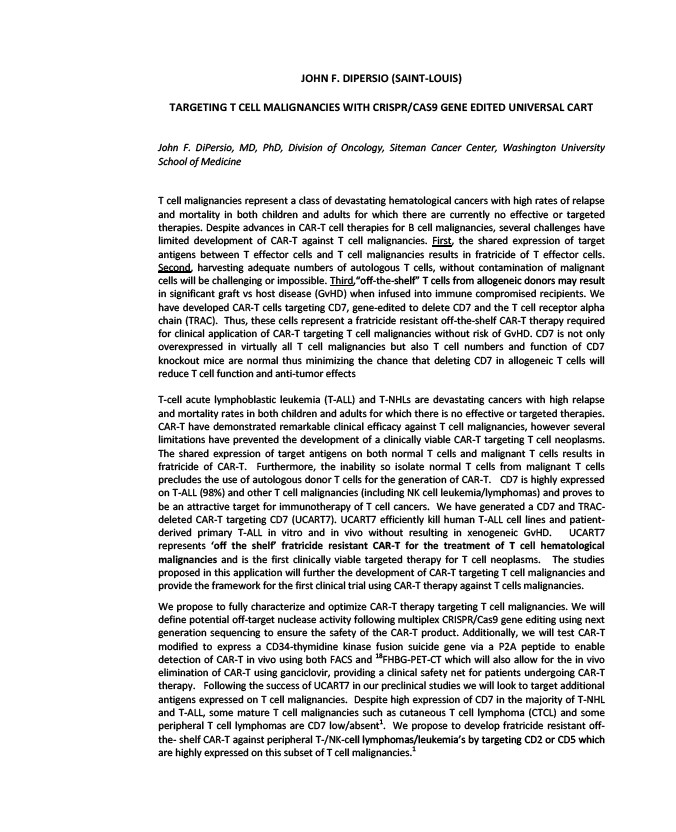
JOHN F. DIPERSIO (SAINT-LOUIS)
TARGETING T CELL MALIGNANCIES WITH CRISPR/CAS9 GENE EDITED UNIVERSAL CART
John F. DiPersio, MD, PhD, Division of Oncology, Siteman Cancer Center, Washington University
School of Medicine
T cell malignancies represent a class of devastating hematological cancers with high rates of relapse
and mortality in both children and adults for which there are currently no effective or targeted
therapies. Despite advances in CAR-T cell therapies for B cell malignancies, several challenges have
limited development of CAR-T against T cell malignancies. First, the shared expression of target
antigens between T effector cells and T cell malignancies results in fratricide of T effector cells.
Second, harvesting adequate numbers of autologous T cells, without contamination of malignant
cells will be challenging or impossible. Third,“off-the-shelf” T cells from allogeneic donors may result
in significant graft vs host disease (GvHD) when infused into immune compromised recipients. We
have developed CAR-T cells targeting CD7, gene-edited to delete CD7 and the T cell receptor alpha
chain (TRAC). Thus, these cells represent a fratricide resistant off-the-shelf CAR-T therapy required
for clinical application of CAR-T targeting T cell malignancies without risk of GvHD. CD7 is not only
overexpressed in virtually all T cell malignancies but also T cell numbers and function of CD7
knockout mice are normal thus minimizing the chance that deleting CD7 in allogeneic T cells will
reduce T cell function and anti-tumor effects
T-cell acute lymphoblastic leukemia (T-ALL) and T-NHLs are devastating cancers with high relapse
and mortality rates in both children and adults for which there is no effective or targeted therapies.
CAR-T have demonstrated remarkable clinical efficacy against T cell malignancies, however several
limitations have prevented the development of a clinically viable CAR-T targeting T cell neoplasms.
The shared expression of target antigens on both normal T cells and malignant T cells results in
fratricide of CAR-T. Furthermore, the inability so isolate normal T cells from malignant T cells
precludes the use of autologous donor T cells for the generation of CAR-T. CD7 is highly expressed
on T-ALL (98%) and other T cell malignancies (including NK cell leukemia/lymphomas) and proves to
be an attractive target for immunotherapy of T cell cancers. We have generated a CD7 and TRAC-deleted
CAR-T targeting CD7 (UCART7). UCART7 efficiently kill human T-ALL cell lines and patient-derived
primary T-ALL in vitro and in vivo without resulting in xenogeneic GvHD. UCART7
represents ‘off the shelf’ fratricide resistant CAR-T for the treatment of T cell hematological
malignancies and is the first clinically viable targeted therapy for T cell neoplasms. The studies
proposed in this application will further the development of CAR-T targeting T cell malignancies and
provide the framework for the first clinical trial using CAR-T therapy against T cells malignancies.
We propose to fully characterize and optimize CAR-T therapy targeting T cell malignancies. We will
define potential off-target nuclease activity following multiplex CRISPR/Cas9 gene editing using next
generation sequencing to ensure the safety of the CAR-T product. Additionally, we will test CAR-T
modified to express a CD34-thymidine kinase fusion suicide gene via a P2A peptide to enable
detection of CAR-T in vivo using both FACS and 18FHBG-PET-CT which will also allow for the in vivo
elimination of CAR-T using ganciclovir, providing a clinical safety net for patients undergoing CAR-T
therapy. Following the success of UCART7 in our preclinical studies we will look to target additional
antigens expressed on T cell malignancies. Despite high expression of CD7 in the majority of T-NHL
and T-ALL, some mature T cell malignancies such as cutaneous T cell lymphoma (CTCL) and some
peripheral T cell lymphomas are CD7 low/absent1. We propose to develop fratricide resistant off-the-
shelf CAR-T against peripheral T-/NK-cell lymphomas/leukemia’s by targeting CD2 or CD5 which
are highly expressed on this subset of T cell malignancies.1